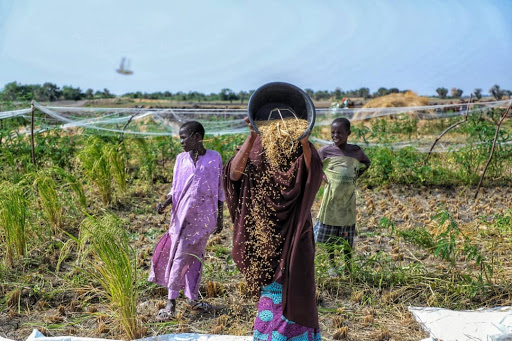Amidst Insecurity, Farmers In Northeast Nigeria Commence Wet Season Farming
Farmers in Borno State, Northeast Nigeria, have begun the process of cultivating their lands despite the threats posed by insurgents.

Civilians in the Northeast State of Borno, have commenced wet season farming activities across several locations, defying the risks of attacks from insurgents.
Farmers in the region usually practice wet and dry season farming particularly in areas located around the wetlands or close to bodies of water. But they have over the years become targets for attacks by insurgents who launched a terror campaign over a decade ago.
According to a situation report from the United Nations Office for the Coordination of Humanitarian Affairs (OCHA) in Borno, civilian populations across communities are gearing up to take advantage of the rainy season to engage in agricultural activities, not minding the risks of attacks.
The report added that Babagana Zulum, Governor of Borno State had recently reopened several farming routes including in Molai, Dalwa, Konduga, and Damboa road near Maiduguri, the state capital, noting that food cultivation, despite ongoing insecurity, is critical to avert catastrophic food insecurity in the state.
“All farming routes in Monguno Local Government Area closed for more than three years due to insecurity were reopened this week. Internally Displaced Persons in Damboa Local Government Area started moving out to farming areas, with some running into gunmen along the routes,” the governor was quoted as saying in a report.
The OCHA stated that some 1.2 million people, mostly in Borno, are projected to face alarming levels of food insecurity during the lean season (June–August) in the conflict-affected northeast region.
“A high-level mission of ambassadors of leading donor countries visited the state on Wednesday, June 23, 2021 and emphasised the need for the urgent scale-up of food and nutrition assistance as the northeast region enters a critical phase. An in-country task force, jointly led by Government and partners has been formed in response to the threat of catastrophic food insecurity,” OCHA said.
“The Taskforce has begun response efforts in vulnerable communities, ensuring a multi-sectoral approach to averting hunger in hard-to-reach and unreached communities in the northeast.”
On Monday, July 5, 2021, Governor Zulum visited Damasak in Mobbar Local Government Area, where 3,000 families are expected to benefit from the second phase of farm inputs’ packages.
The families will be provided with inputs such as improved seeds, fertilizer, water pumps and chemicals.
“Earlier this year, we were here to support some of our farmers in the first phase. In this second phase, we will profile 3,000 families from those that did not benefit and we shall support them for both irrigation and rain fed farming. The 3,000 households to benefit will translate to about 20,000 or less persons benefiting from the scheme,” Zulum said.
Support Our Journalism
There are millions of ordinary people affected by conflict in Africa whose stories are missing in the mainstream media. HumAngle is determined to tell those challenging and under-reported stories, hoping that the people impacted by these conflicts will find the safety and security they deserve.
To ensure that we continue to provide public service coverage, we have a small favour to ask you. We want you to be part of our journalistic endeavour by contributing a token to us.
Your donation will further promote a robust, free, and independent media.
Donate HereStay Closer To The Stories That Matter




